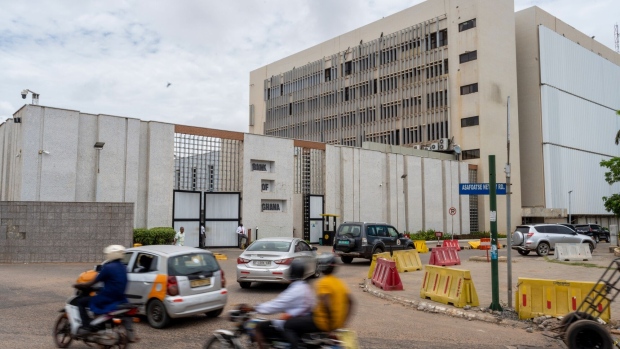Jun 29, 2024
IMF Approves $360 Million Payout to Ghana After Debt Deal
, Bloomberg News

(Bloomberg) -- The International Monetary Fund agreed to immediately disburse $360 million to Ghana, after the country reached a debt restructuring agreement with its official creditors.
The new tranche brings to $1.56 billion the West African nation has received from the Washington-based lender, since it signed on to the $3 billion three-year program in May 2023, the IMF said in a statement Friday following an executive board meeting.
The new inflows will help the Bank of Ghana defend the cedi, which has lost almost 22% of its value against the dollar this year, making it the fourth-worst performing currency among those tracked by Bloomberg.
The board’s decision confirms a staff-level recommendation in April that the third tranche of funding be disbursed, provided the West African nation secured a memorandum of understanding with the bilateral lenders on revamping $5.1 billion of debts, which it attained on June 11.
“This agreement on a debt treatment, consistent with program parameters, provided the financing assurances necessary for the second review under the extended credit facility arrangement to be completed,” IMF said.
On Monday, Ghana, which is reorganizing almost all of its $43 billion of debts under the Group of 20’s Common Framework, also reached an agreement in principle with private creditors to rework $13 billion of eurobonds, marking one of the last laps in the revamp journey that started 18 months ago.
Zambia clinched a similar arrangement with investors that enabled the southern African nation to issue two series of restructured notes earlier this month after nearly four years of default.
Ghana’s deal with private creditors is consistent with program parameters but it is subject to confirmation on comparability of treatment by the official creditor committee, IMF said.
December Elections
The G-20 framework expands the Paris Club of sovereign creditors to include China and other nations. Its comparability of treatment principle aims to ensure that debt losses in the process of restructuring are reasonably shared between bond investors and bilateral lenders.
“Ghana’s performance under the IMF-supported program has been generally strong,” IMF said. “The medium-term outlook remains favorable but subject to downside risks — including those related to the upcoming general elections.”
Ghana is preparing for presidential and parliamentary elections on Dec. 7, which heightens the risk of election-related budget overruns.
(Updates with comments from IMF from fifth paragraph.)
©2024 Bloomberg L.P.






